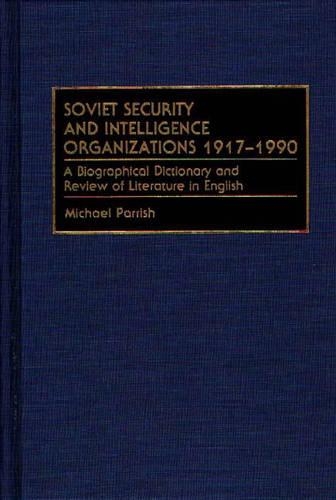
Soviet Security and Intelligence Organizations 1917-1990: A Biographical Dictionary and Review of Literature in English
(Hardback)
Publishing Details
Soviet Security and Intelligence Organizations 1917-1990: A Biographical Dictionary and Review of Literature in English
By (Author) Michael Parrish
Bloomsbury Publishing PLC
Greenwood Press
30th January 1992
United States
Classifications
Tertiary Education
Non Fiction
Espionage and secret services
Reference works
327.120947
Physical Properties
Hardback
704
Description
One of the hallmarks of the Soviet system was its heavy reliance on internal and foreign security and intelligence organizations. Not surprisingly, given the secrecy surrounding Soviet efforts in these areas, no biographical reference tools and few bibliographies have been published to date. In this context, Michael Parrish's work is a unique undertaking. In the first section to the volume, biographies are provided on some 4,000 officials in senior and mid-level positions who had served in Cheka, NKVD/RFSFR, GPU, KGB, and other organizations. Also included are officials of the Committee for State Control (formerly Ministry of State Control, and, before that, Commissariat of Workers and Peasants' Inspection). Prominent political personalities with earlier ties to security services, such as N.A. Bulganin, are listed even though such service formed only a brief part of their careers. Others listed include party officials, such as A.A. Kuznetsov, who at different times served as the Party's watchdog of security organs. Also included, because of their close association with repression and security organs, are members of Stalin's inner circle. The second part of the volume is a survey of books in English published between 1917 and 1990 which related to Soviet security and intelligence organizations. This is followed by a biographical addendum, a glossary of terms, and material showing the development of Soviet security organizations. No one concerned with current intelligence issues and the role of security organizations in Soviet life can ignore this volume.
Reviews
Despite the collapse of the USSR, the Soviet security apparatus and its leaders remain a mystery. Several bibliographies concerning intelligence and espionage appeared in the early 1980s; none focuses specifically on the USSR. Biographies of police and intelligence officials are frequently available only through often unreliable Soviet sources. In this biobibliography, Sovietologist Michael Parrish attempts to remedy these deficiencies. The result is both impressive and frustrating. The organization is straightforward. A biographical section, the largest in the book, provides brief entries on 4,000 senior and mid-level officials holding positions in one or more of the security services from 1917 to 1990. The length and completeness for each varies with the importance of the subject and the amount of information available. A smaller section contains an annotated list of English-language books about Soviet police and intelligence agencies. Parrish (Indiana University) provides critical annotation for those works he regards as significant. However, Parrish gives those interested in the history of Soviet police and intelligence operations a starting point for research--particularly for biographies.-Choice
This timely work should stimulate further research on the organizations foundational to the Soviet state and their undetermined role in the Soviet Union's successor entities.-ARBA
"This timely work should stimulate further research on the organizations foundational to the Soviet state and their undetermined role in the Soviet Union's successor entities."-ARBA
"Despite the collapse of the USSR, the Soviet security apparatus and its leaders remain a mystery. Several bibliographies concerning intelligence and espionage appeared in the early 1980s; none focuses specifically on the USSR. Biographies of police and intelligence officials are frequently available only through often unreliable Soviet sources. In this biobibliography, Sovietologist Michael Parrish attempts to remedy these deficiencies. The result is both impressive and frustrating. The organization is straightforward. A biographical section, the largest in the book, provides brief entries on 4,000 senior and mid-level officials holding positions in one or more of the security services from 1917 to 1990. The length and completeness for each varies with the importance of the subject and the amount of information available. A smaller section contains an annotated list of English-language books about Soviet police and intelligence agencies. Parrish (Indiana University) provides critical annotation for those works he regards as significant. However, Parrish gives those interested in the history of Soviet police and intelligence operations a starting point for research--particularly for biographies."-Choice
Author Bio
MICHAEL PARRISH is Associate Professor in the School of Public and Environmental Affairs, Indiana University. He is a recognized authority on Soviet intelligence and military affairs.
